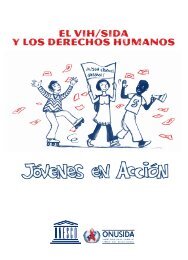the united republic of tanzania health sector hiv and aids strategic plan
the united republic of tanzania health sector hiv and aids strategic plan
the united republic of tanzania health sector hiv and aids strategic plan
Create successful ePaper yourself
Turn your PDF publications into a flip-book with our unique Google optimized e-Paper software.
Key Implementers<br />
MoHSW, Academic Inst, Reference <strong>and</strong> Zonal lab<br />
Intervention area 4: Priority HIV <strong>and</strong> AIDS <strong>and</strong> STI research.<br />
Preamble<br />
Research is a support function in <strong>the</strong> <strong>health</strong> <strong>sector</strong> strategy. Research is expected to:<br />
provide <strong>the</strong> evidence- base needed to respond to <strong>the</strong> myriad <strong>of</strong> complex issues arising from <strong>the</strong><br />
epidemic itself <strong>and</strong> <strong>the</strong> attempts to control it.<br />
facilitate <strong>the</strong> identification <strong>and</strong> underst<strong>and</strong>ing <strong>of</strong> determinants <strong>of</strong> HIV spread<br />
support <strong>the</strong> national response against HIV/ AIDS/ STI s <strong>and</strong> TB.<br />
Situation analysis<br />
The National Health Policy on HIV/AIDS has provisions for promoting <strong>and</strong> supporting multi-disciplinary<br />
operations research on HIV <strong>and</strong> AIDS. In order to produce information relevant for solving <strong>the</strong> complex<br />
questions existing in <strong>the</strong> epidemic operational research is considered.<br />
At <strong>the</strong> present time <strong>the</strong>re are some partners <strong>and</strong> agencies who are still interested in supporting operations<br />
research on HIV/AIDS.<br />
Achievements<br />
The existence <strong>of</strong> two national institutions coordinating research namely, The National Institute<br />
for Medical Research, an institution within <strong>the</strong> MOHSW <strong>and</strong> The Tanzania Commission for<br />
Science <strong>and</strong> technology (COSTECH) <strong>and</strong> The Tanzania Commission for Science <strong>and</strong><br />
Technology.<br />
Existence <strong>of</strong>” Research priorities on HIV/AIDS /STDs for <strong>the</strong> HIV <strong>and</strong> AIDS Health <strong>sector</strong><br />
strategy”.<br />
o The research gaps in biomedical Research, Surveillance <strong>and</strong> Epidemiological Research,<br />
Social Behavioural <strong>and</strong> Communications Research, Care <strong>and</strong> Treatment <strong>and</strong> Health<br />
Services Research, HIV/AIDS in children <strong>and</strong> infant Research, have been identified.<br />
Collaborative working initiatives between biomedical researchers <strong>and</strong> Traditional Healers have<br />
been implemented by partners especially <strong>the</strong> Institute <strong>of</strong> Traditional Medicine at <strong>the</strong> Muhimbili<br />
University College <strong>of</strong> Health Sciences (ITM-MUCHS).<br />
Most <strong>of</strong> <strong>the</strong> research that has been carried out falls within <strong>the</strong> priority area <strong>and</strong> only 25% is<br />
outside <strong>the</strong> priorities<br />
Challenges<br />
Aspects Challenges <strong>of</strong> Priority HIV <strong>and</strong> AIDS <strong>and</strong> STI research<br />
Availability • Limited underst<strong>and</strong>ing <strong>of</strong> <strong>the</strong> nature <strong>and</strong> driving forces <strong>of</strong> <strong>the</strong> HIV epidemic at<br />
<strong>the</strong> sub-national level <strong>and</strong> among sub-populations<br />
• Paucity <strong>of</strong> research projects that address equity <strong>and</strong> gender dimensions in<br />
HIV <strong>and</strong> AIDS<br />
• Inadequate dissemination <strong>of</strong> <strong>the</strong> results <strong>of</strong> research locally, to policy makers ,<br />
programmes managers <strong>and</strong> <strong>the</strong> beneficiaries<br />
Equitable<br />
access<br />
• Very little has been done in <strong>the</strong> area <strong>of</strong> Paediatrics HIV/AIDS.<br />
• Most funds provided by partners are committed to specific research areas.<br />
This tendency leaves little room for research managers to come up with new<br />
research agenda or research questions. In such a situation conducting <strong>and</strong><br />
supporting operational research becomes difficult <strong>and</strong> little or no funds are<br />
set aside for it.<br />
Quality • Lack <strong>of</strong> research policy on HIV <strong>and</strong> AIDS<br />
• Weak research coordination within NACP thus limited capacity to co-ordinate<br />
59 |FINAL COMBINED-HSHSP 2008-2012: June 24 th 2007










